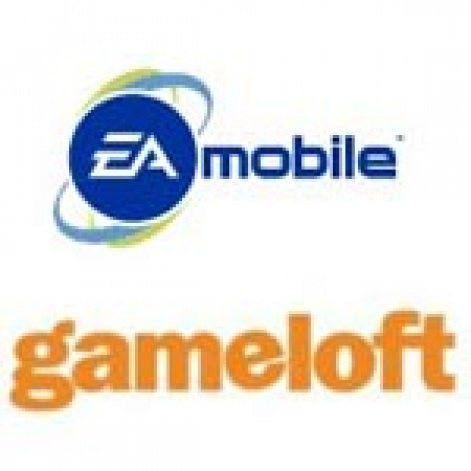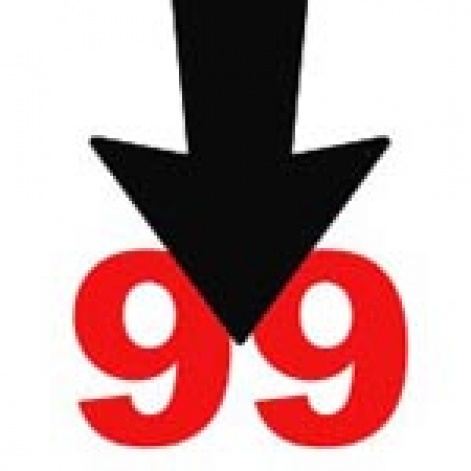And numbers 10 to 6 when it comes to the stories we consider were the most significant mobile gaming stories of 2009 - From the end of N-Gage to the rise of app stores.
So now it's time to get stuck into the real meat - the top five most significant stories...
5. Here comes BlackBerry

With the use of BlackBerries among American corporate types pretty much defined as part of obsessive-compulsive disorder, the platform's rising popularity with a younger, hipper audience generally went unrecognised during 2009.
Yet the launch of the BlackBerry App World in April opened up the purchase of games for the first time. And while there was nothing like the level of developer support as seen for other mobile platforms, app prices remained higher, especially compared to Apple's App Store.
Companies such as Glu, HeroCraft and E-COMM released games for the device, while specialist developers such as Nickel Buddy made the most of the opportunity, by releasing titles that went beyond the previous puzzle oriented fare.
In this context, the news that RIM is enabling in-app advertising, as well as in-app purchases, and OpenGL ES and location-based support for games and apps in 2010 will persuade more developers to test the waters: something the company's Q3 announcement of another 10 million devices and 4.4 million subscribers (total 36 million) should further encourage.

4. Apple enables freemium
The arrival of in-app purchases for iPhone games and apps came with the release of the iPhone OS 3.0 in June. It wasn't until October however that Apple dropped the restriction that it could only be used for paid games.
Much heralded as this opened up the App Store to business models that have been massively successful in the world of social gaming, the first game to take advantage of the opportunity was ngmoco's online shooter Eliminate Pro.
Its successful launch and subsequent high standing in the US Top Grossing top 100 chart during November demonstrated gamers were happy to pay to play, although ngmoco's return on investment is less certain, considering the game's prolonged development and the cost of online hosting.

Since Eliminate, there have been a steady stream of games using a similar business model, including ngmoco's Epic Crime Wars, Boostr's Urban Rivals and SGN's Skies of Glory.
3. EA Mobile and Gameloft rule the App Store
In the early days of Apple's App Store, there were plenty of examples of small Mac-focused developers such as Pangea, not to mention bedroom start-coders such as Steve Demeter (Trism) and Ethan Nicholas (iShoot), doing great business with games that didn't require huge resources to make.
The conceit that the App Store is the place where small developers can compete with the large publishers faded strongly during 2009 however. Of course this was only to be expected thanks to the hundreds of developers and millions of dollars that the likes of EA Mobile and Gameloft can dedicated to their games - licenced or not.
What is surprising however is how quickly those two companies in particular have come to dominate the App Store, both in terms of the number of the games in the top 100, and more significantly, the number of games in the Top Grossing top 20.
The cake maybe getting bigger, but EA Mobile and Gameloft are helping themselves to ever larger slices.
2. The nickel-and-dime dilemma of in-app purchases
Developers were very excited when Apple announced they could use in-app purchases. But despite both being million-sellers, the first games to use the technology - Freeverse's Flick Fishing and Pangea's Enigmo - experienced different levels of sales, with Flick Fishing doing over 70,000 downloads and Enigmo much, much less.

Indeed, how to present in-app purchases to gamers, as well as how much and what content to lock away behind price walls, and at what price (especially with respect to the initial game price), has been a significant area for discussion in 2009.
Still, there have been successes. Com2uS revealed 30 percent of Homerun Battle 3D's revenue came from in-app purchases, Bolt Creative said Pocket God's IAP peaked at around 20 percent, while Tapulous announced Tap Tap Revenge 3 had done over one million in-app song downloads - estimated revenue of around $350,000.
The fear remains however that as many developers move to this model from the standard pay once standard, gamers will become more sensitive to being nickel-and-dimed, something the likes of Aurora Feint are already pointing out.
1. Apples App Store death drop to 99c
There's no doubt when it comes to the biggest story of the year that the price deflation of iPhone games has been the most significant event of 2009.
As we're tracked fairly regularly in our App Store Analysis articles, the average price of the US top 100 was $3.20 in early July, but hasn't risen over the $3 barrier since. Indeed, it got as low as $2.43 at the end of August.
More worrying is that the average price of games in the US top 10 has been as low as $1.19 and is almost always much less than the average top 100 price, suggesting developers have to release games at 99c in order to gain the exposure they need to get the volume of sales to break even.
In this context, the figure of $40,000 as the budget for a 99c game - as argued by Nigel Little of UK studio Distinctive Developments - has been a pivotal point around which much of the debate has circled.
Indeed, it's the more established developers such as Fishlabs, HandyGames and Pangea who have argued strongly that the drop to 99c is killing the iPhone gaming market.
In contrast, 99c games such as Graveck's Skee-Ball, Lima Sky's Doodle Jump, Bolt Creative's Pocket God, and Firemint's Flight Control have demonstrated that some - albeit a handful of - start-ups can find commercial success even at this level.
And notably, an even smaller number of start-ups have managed to have commercial success at higher price points; notably Tiger Style with its Spider: The Secret of Bryce Manor ($2.99) and Semi Secret with Canabalt ($2.99).
Yet what's clear is the vast majority of developers operating at this level will not survive in 2010 unless they are very lucky, or diversify: either embracing new platforms (Android, PSPgo, DSiWare, BlackBerry etc) or new business models (in-app purchases, in-app advertising, freemium).





















